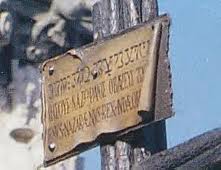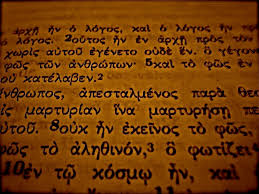When the Lord Jesus Christ was crucified a sign was placed at the top of the cross written in three languages. Here is was the Apostle John tells us about it:
19 Pilate also wrote an inscription and put it on the cross. It read, “Jesus of Nazareth, the King of the Jews.” 20 Many of the Jews read this inscription, for the place where Jesus was crucified was near the city, and it was written in Aramaic, in Latin, and in Greek (John 19:19-20)
This detail about the death of Jesus is very informative. It shows that on the day when Christ died that He did so in a multicultural world. Jesus came from a Jewish heritage and so the Hebrew on the sign bore witness to the Jews. But it was also written in Greek which was the “lingua franca” (common trade language) of the first century world. And finally it was written in Latin for that was the world empire under whose authority Christ had been executed.
Since that time, language has never ceased to be an issue in the spreading of the Christian faith. But from the sacking of Rome in 410 A.D. until the beginning of the Protestant Reformation in the 16th Century, Latin was the theological and academic common language in the West.
Because of this millennium when Latin reigned supreme, C. S. Lewis as a medievalist eagerly sought familiarity with this colorful and precise language.
Interestingly, Lewis received a letter from an Italian Roman Catholic Priest Don Giovanni Calabria. Calabria did not speak English and Lewis was not fluent in Italian. But both men were very familiar with Latin and so this became their common language of correspondence. Their letters have been saved and published in a book called The Latin Letters of C. S. Lewis. Here is a description of the work:
“This is translated collection of letters written in Latin by C.S. Lewis to a distinguished Roman Catholic priest, Don Giovanni Calabria (1873-1954), known not only for his piety and writing but for the home he founded for orphans in his native Verona, Italy. The central theme is Christian unity, written from well within the Anglican tradition. Other great Christian themes are also touched upon and alongside these, the thoughts of Lewis’s own writing, his reading and of the tragic death of his wife, Joy. There is also a lengthy introduction by Martin Moynihan, who discovered the letters among the C.S.Lewis archive and who comments on their language, content and relationship with C.S.Lewis’s other work.”
With the invention of the printing press and arduous work by groups like Wycliffe Bible translators the Scriptures have been translated into more languages around the world than any other book. We do not need to know Hebrew, Greek or Latin in order to read the Word of God because it has been translated into our own language. Yet there is still a common language of correspondence and that is language of love – love for God and love for one another. Let’s read an excerpt from the Apostle John’s first Epistle which reflects this theme:
“7 Beloved, let us love one another, for love is from God, and whoever loves has been born of God and knows God. 8 Anyone who does not love does not know God, because God is love. 9 In this the love of God was made manifest among us, that God sent his only Son into the world, so that we might live through him. 10 In this is love, not that we have loved God but that he loved us and sent his Son to be the propitiation for our sins. 11 Beloved, if God so loved us, we also ought to love one another. 12 No one has ever seen God; if we love one another, God abides in us and his love is perfected in us.
13 By this we know that we abide in him and he in us, because he has given us of his Spirit. 14 And we have seen and testify that the Father has sent his Son to be the Savior of the world. 15 Whoever confesses that Jesus is the Son of God, God abides in him, and he in God. 16 So we have come to know and to believe the love that God has for us. God is love, and whoever abides in love abides in God, and God abides in him. 17 By this is love perfected with us, so that we may have confidence for the day of judgment, because as he is so also are we in this world. 18 There is no fear in love, but perfect love casts out fear. For fear has to do with punishment, and whoever fears has not been perfected in love. 19 We love because he first loved us. 20 If anyone says, “I love God,” and hates his brother, he is a liar; for he who does not love his brother whom he has seen cannot[a] love God whom he has not seen. 21 And this commandment we have from him: whoever loves God must also love his brother” (1 John 4:7-21).
Describe ways you have either written or received a letter in the common language of Christian love.










How interesting that you ask this question today. Perhaps motivated by the discussions we have been having about written correspondence, not even an hour ago I wrote the following to my first Pastor. The Lord brought him to my mind this morning and I decided to reach out to him with a word of encouragement. He is now in his mid 80’s:
Hello Pastor Ted,
I was counting my many blessings this morning and you came to mind. I decided to drop in on you and let you know how much I love and appreciate you!
It seems like only yesterday but it was nearly 40 years ago that I was saved…May 8th, 1975. We began attending the First Baptist Church in Otsego where you were the Pastor. I am so thankful for the love you showered on Sharon, David, and me. Your ministry at that time and in that place was so used of God to place a firm footing and foundation in our lives. We will be forever thankful that God raised up a faithful servant like yourself who taught and preached His Word and lived a life before us new converts that has had lasting impact! Thank you for investing your life into people like us and thousands of others whom your efforts in the Lord have touched!
I hope you and Pat are doing well.
God bless you!
LikeLike
Bob: I don’t think it is coincidence which prompted you to write the elder pastor. The Christian life is filled with surprises. The term serendipity is some times used: “Serendipity means a ‘fortunate happenstance’ or ‘pleasant surprise’. It was coined by Horace Walpole in 1754. In a letter he wrote to a friend, Walpole … made [reference] to a Persian fairy tale, The Three Princes of Serendip. The princes, he told his correspondent, were ‘always making discoveries, by accidents … of things which they were not in quest of’”. Thanks for letting us in on the letter of Christian love you just sent.
LikeLike
On May 4, 1971 I was in the chapel at WVU to meet this guy from Inter-varsity Christian Fellowship to go on our first date. It was a popular meeting place on campus to connect with other Christians for prayer. We met there briefly before we went for pizza. Before we left he told me he didn’t know if I was the one the Lord had selected for him to marry but if I was the one, he wanted to get to know me better, if I wasn’t the one he was sure God could use me to prepare him for the one he was to marry. He told me he would tell me he loved me when he could back it up with “Will you marry me?” I was kind of blown away with his honesty at this point (did I mention this was our first date?) but then, he gave me a red rose and this poem.
“Something that is fair,
To one who is fairer,
In the Name of the fairest One, Jesus.”
This Christmas, the year we celebrated 40 years of marriage, he surprised me again with roses. This time there were two roses, a red one and a multi-colored one. They were the hints of what his gift to me this year would be. The surprise was he’d purchased tickets for us to attend the Tournament of Roses Parade in Pasadena, California. He’s a romantic at heart!
His poem contains the most beautiful words in the common language of Christian love I’ve ever received.
LikeLike
What a wonderful love story, Despina. How appropriate as February 14 approaches. 🙂
LikeLike